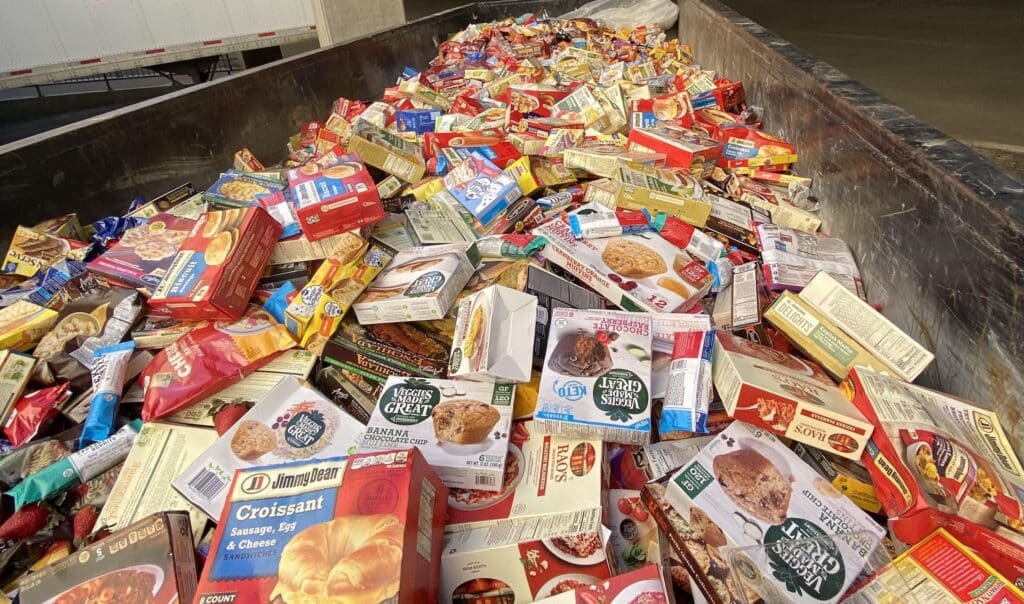
You may have seen photos like the one above shared on social media from time to time – grocery store trash bins, filled with what looks like perfectly good food, going to waste. “A large dumpster… full of food,” a Reddit user captioned the image above. “Food waste at this level is a travesty,” a commenter responded. “This should be illegal,” another added.
In one state, it soon might be.
New Jersey lawmakers have advanced a bill that would require grocery stores to donate unsold but edible food, rather than throwing it out. The measure, introduced by Democratic Assemblyman Bill Moen and his Democratic colleague, Assemblywoman Shama Haider, calls for large grocery retailers to “make a reasonable effort to donate all food that is fit for human consumption, but that would otherwise be discarded in the normal course of business by the supermarket, grocery store, or food supplier, to a food bank, a nonprofit organization, or to any person.”
Introduced earlier in the current legislative session, the bill passed the Assembly’s Children, Families and Food Security Committee last week. It now heads to the full Assembly for a potential floor vote.
“Every meal that we are able to rescue from disposal is a step in the direction of a healthier and more sustainable future,” Moen said in a statement when the measure was first proposed. The bill “would tackle the growing issue of food waste in a way that benefits those struggling with food insecurity, especially in food deserts where access to fresh and nutritious options is already limited.”
“As legislators we cannot overlook the astonishing level of food waste taking place in our country,” Haider added. “By requiring large food retailers to donate surplus food, we prevent waste while providing healthy meals to individuals facing food insecurity.”
The lawmakers cited statistics from the National Resource Defense Council, which has found that as much as 40% of food in the country goes uneaten – in part because a lot of it is never sold.
Some aren’t so sure that a government mandate is necessary, or advisable. “All of our members that are currently able to donate to their local organizations do so,” New Jersey Food Council Vice President Mary Ellen Peppard said in testimony before the committee last week. “New Jersey Food Council members have very robust partnerships with food banks. It’s very organized and efficient.” But there are strict rules and food safety requirements to follow, she explained, so “we view this bill as unnecessary and potentially burdensome.”
Republican Assemblyman Paul Kanitra appeared to agree. “What is a ‘reasonable effort’?” he asked. “What are the penalties for noncompliance?” And why does the measure only apply to stores in which at least 90% of their inventory consists of “food and related products,” which would exclude everything from dollar stores to Walmart?
In addition, while supporters of the bill said it was more of a strong suggestion than a mandate, Kanitra pointed out that the bill’s wording “requires” compliance. “Getting more food into hungry people’s hands is an important thing,” he said. “But overburdening the businesses is tough, too.”
According to the nationwide network of food banks Feeding America, retailers have donated more than half a billion pounds of food in the first three months of this year alone. “Foods that are nearing their sell-by date, appear cosmetically imperfect or are overproduced can benefit the tables of the tens of millions of people in America,” the group said in its most recent Impact Report.
But all that food in the photo above? None of it was “cosmetically imperfect” or simply nearing expiration. Target, which threw it away, said it was, sadly, not fit to sell, donate or eat. The store “experienced a major power loss that resulted in a total food loss because food products were unsafe to sell,” a spokesperson for the retailer explained after the photo was shared earlier this year. “This was an isolated incident, and is not a part of our regular practices.”
“Our members very happily have food donation programs,” Peppard emphasized to lawmakers last week. “It’s just in those circumstances when they cannot, because protocols aren’t necessarily being followed, that they’re not sure what kind of position this (bill) puts them in.”
Nevertheless, a majority of committee members voted to advance the bill, suggesting that any ambiguities would be worked out before it was voted on by the full Assembly. The measure is “requiring a ‘reasonable effort’ to donate,” Democratic Assemblyman Bill Spearman pointed out. “Requiring them to do something that’s against the rules that govern them is not ‘reasonable’. I think that’s the out that the supermarkets have in this situation.”
A “reasonable effort,” to donate “food that is fit for human consumption,” by stores consisting of at least 90% of “food and related products,” without any enforcement penalties, adds up to a lot of “outs.” So this may turn out to be a well-meaning measure that shrinks under scrutiny. But if it brings some attention to the problem of food waste, and to those who could benefit from having good food donated instead of thrown away, the measure may have served its purpose – regardless of whether it goes on the books, or ends up in the legislative trash bin.
Image source: Reddit










